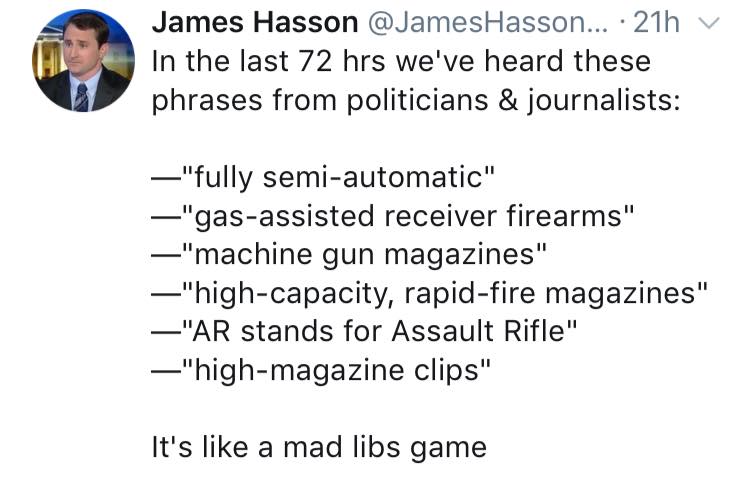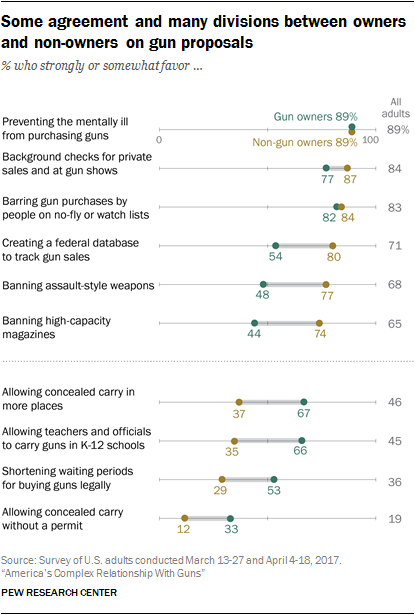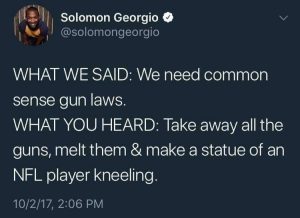Each time our country focuses on the gun debate, a lot of proponents of gun control accuse gun rights advocates of not caring whether people die. It’s my impression that gun control proponents believe gun rights advocates disagree with gun control legislation because we are selfish, insane,[ref]Note in the linked story, CNN fails to mention that the church they are covering is actually a cult.[/ref] and possibly sociopathic. If we cared about saving innocent lives, especially those of school children, why would we fight against common sense gun reform? I’d like to offer a few thoughts on how about half of America could disagree with certain gun control proposals for reasons other than mental or moral defect.
1) Gun rights advocates think of each gun policy in terms of a cost benefit analysis. Is there evidence that Policy X will decrease the frequency or lethality of mass shootings or of gun crime in general? How will the policy affect citizens’ abilities to defend themselves? Is it Constitutional?
It’s my impression that many gun control advocates don’t view policy proposals the same way. I’ve seen a lot to suggest gun control advocates believe (a) few or no people really use their guns in self defense[ref]The most modest estimate puts gun use for self-defense at 108,000 times per year. Other estimates place the number an order of magnitude higher.[/ref] and (b) either the Constitution has been interpreted incorrectly by SCOTUS or, even if the Founders did intend personal gun ownership, their views were borne of circumstances that no longer apply today. And I expect that if I too thought the factors of self-defense and Constitutionality were greatly exaggerated or even made up, I would view certain gun policies very differently. If you don’t believe the policy will cost anything substantial, you don’t really need to do a cost benefit analysis (and therefore you will have a very different idea of which reforms are “common sense”). I think, generally, that’s how most gun control advocates see this, but I’m open to correction there.
2) There seems to be an asymmetry of knowledge about guns between the gun control and gun rights sides, and it influences whether each side thinks a given policy will be effective or have undesirable side effects.
I get how gun rights advocates come off as pedantic when correcting terminology, and it’s easy for me to believe that there are people who really are just trying to feel superior or make the other side feel foolish. But I think the terminology and concepts are a lot more than semantics: they are directly relevant to the effects a given policy will have.

And from the gun rights side, it appears that the people most passionate and insistent on certain policies have little understanding of what those policies would mean. I’m really not trying to be rude and I’m sorry if it comes off that way. But the same side posting memes like this…
…just proposed legislation that would ban tens of millions of civilian-owned guns.
The bill prohibits the “sale, transfer, production, and importation” of semi-automatic rifles and pistols that can hold a detachable magazine, as well as semi-automatic rifles with a magazine that can hold more than 10 rounds. Additionally, the legislation bans the sale, transfer, production, and importation of semi-automatic shotguns with features such as a pistol grip or detachable stock, and ammunition feeding devices that can hold more than 10 rounds.
For reference, many of the most recommended pistols bought for home defense and as concealed carry firearms are semi-automatic and can hold more than 10 rounds; it’s also standard for pistols to have detachable magazines.[ref]The text of the Assault Weapons Ban of 2018 (HR 5087) specifies that a semi-automatic pistol with a capacity of 10 rounds or fewer must include more features besides the detachable magazine before that pistol would be included in the ban. I’m not clear how many such pistols would qualify, although the capacity limitation alone would preclude many.[/ref]

I think for the most part the people who support that legislation don’t even realize that’s what the legislation would do. They believe it would ban only the so-called assault weapons that they further believe are used in most mass shootings. Neither of those beliefs are true.[ref]As both Mother Jones and Mayors Against Illegal Guns have shown, most mass shootings are conducted with firearms that aren’t assault weapons and don’t even hold high capacity magazines.[/ref]
3) I recognize some gun rights advocates have a knee jerk reaction against any limitation on guns; I think this reaction is primarily due to believing both that the legislation will make no positive difference and that it will be a slippery slope. The general impression from the gun rights side is that the gun control side neither understands guns nor cares how legislation would affect general gun ownership because they don’t believe people should have guns in any case. It’s not so much “We want to take your guns” as “we don’t know or care if the proposals we’re pushing will result in taking your guns.”
4) That said, there are proposals that even most gun owners would be fine with. Proposals focusing on who can have guns rather than which guns they can have seem to get pretty broad support. For example, Pew Research has found that most gun owners and non-gun owners alike support proposals focused on background checks, mental health issues, and no-fly lists.

More recently there seems to be momentum behind “red flag” measures which would allow authorities to temporarily take guns from people deemed dangerous. Such bills are primarily sponsored by Democrats but are seeing some Republican support too. I think the gun rights side generally believes that proposals that focus on the people rather than the guns are more likely to be both effective and Constitutional.[ref]I don’t necessarily agree with some of the measures I mention in this post, but I think I’m the exception here.[/ref]
So why do gun rights advocates fight common sense gun reform? To summarize:
- We don’t believe many of these policies would accomplish what proponents claim.
- We’re worried about inhibiting citizen self-defense.
- We’re concerned about the Constitutionality of some of these policies.
- We suspect the people pushing for these reforms don’t understand or care about the full effects of these policies.
None of this means we don’t care if innocent people are hurt. That’s why we do support some gun reforms: specifically the policies we believe will best ensure the safety of ourselves and others while respecting Constitutional rights.


AS long as I’ve been politically aware the gun control debate has NEVER been had with anything close to resembling honesty.
I dont think the hyperbole and inaccurate statements are borne of ignorance of the subject matter. I think they’re intended to inflame and make real solutions impossible.
Liberal Democrats NEED problems they can blame the Republicans for not solving.
I’d be interested to know more about the nature of the cost-benefit analysis you say you think gun rights advocates do. My understanding is that having a gun in your home for protection makes you less safe, on average, so the “cost” of defending yourself with other methods is generally a benefit (though there are some people who face particular threats so serious that the probability of accidental damage or intentional self-harm would be outweighed). So a quantitative analysis would seem to suggest that virtually any gun control measure which results in fewer people being armed would improve public health.
As for the gun control proposals you claim gun rights advocates support, who’s stopping you? My understanding is that federal gun control laws have only gotten looser over the past 20 years, and that the NRA is behind the provision that background checks which don’t come back fast enough count as cleared for sale. To any but a hopelessly naive observer, that looks like the explanation for why the background check system is underfunded (as is its enforcement). So, if gun owners truly want a broader, better-supported background check system which includes consideration of mental health and no-fly/watch list status, are we to believe that it’s liberals who are holding Congress back? My hypothesis is that gun rights advocates who say they want these things know they’ll alienate their most extreme fellows if they support them openly, and it isn’t worth it to them. If gun rights advocates want Congress to mandate collection of information about the effects of guns on public health, and wants the CDC to have permission and funds to study the issue in depth, what could possibly stop them?
The obvious answer seems to be that, if the NRA put its full weight behind these measures, they’d be law in months, perhaps weeks. But it’s not a priority for the members who favor them, and it’s opposed by some of them, so the NRA hasn’t pushed. Does it seem otherwise to you?
To put Kelsey’s comments more bluntly, the NRA opposes any and all gun regulation, common sense or otherwise. They don’t pull funding from politicians for supporting the occasional background check bill, on occasion, but make no mistake that they have been controlling this debate for the past 30 years, despite what we regular citizens would like to believe. That is why there are still “common sense” regulations to talk about enacting — the NRA has successfully blocked them so far. I’m sure that Democrats would happily get on-board with any incremental tightening of gun acquisition laws that Republicans propose. But they haven’t. That is why people are so angry right now.
Furthermore, if you honestly look at the research, guns do not actually make you safer. They make you *feel* safer, but that’s because fear interferes with our ability to process information logically. Here’s one of the best ways I’ve seen the statistics stated: https://www.washingtonpost.com/news/wonk/wp/2015/06/19/guns-in-america-for-every-criminal-killed-in-self-defense-34-innocent-people-die/?utm_term=.c17fdaf71fb7
I grew up in a house with guns. Many of my relatives keep guns. After learning the statistics, I decided that I will never have a gun inside my home.
Gundy still does not seem to the “big one where SCOTUS finally rules on the constitutionality of the Registry itself. Nonetheless it appears to me that they are inching their way to that. I agree with others who think that good, or at least interesting outcomes will come from this case
Tyler, the stat is not nearly as convincing as you think it is because it leaves out:
1. Every time a gun was used and someone wasn’t killed
2. The general deterrent effect of gun ownership
These numbers are very hard to get stats on, but estimates of actual defensive gun use vary from 55,000 to nearly 5,000,000 per year.
It’s just not very convincing to try and tell people guns make them less safe and then leave off the two categories that have the biggest impact.
https://en.wikipedia.org/wiki/Defensive_gun_use#Estimates_of_frequency
Nathaniel, that’s an absolutely fair point, but it goes both directions. Sure, defensive uses of guns which only wound, are more common than those which kill, but presumably accidental uses which wound are also more common than those which kill. Similarly, guns may be used to threaten harm rather than retaliation, and I imagine we are all familiar with televised examples in the hands of thieves and abusers. Unless you’ve some reason to think the proportions of fatalities/wounds/brandishing are very different for defensive uses than for offensive ones, your point that we’re undercounting the defensive value of guns applies equally well to suggest that we’re also undercounting the costs they impose.
But that’s not where we ought to stop. Rather than simply debating the value of a particular point, we ought to try to look at the mass of evidence, however inadequate due to NRA interference, and see which way it tells. I’ve seen several Internet comments with links to published studies, have seen it noted that owning a gun is bad for your insurance rates, and have googled “does owning a gun make you safer”. I’m persuaded that, unless I at some point have reason to fear a specific threat, I and my family are safer without. I can point to those sources, but since I obviously have a preference on the policy, perhaps it’d be more persuasive for others to search in their own ways.
You do realize that Google as an entity is anti-gun, so using a forum for searches to search on gun information which itself is biased is going to taint the search, right?
Joel, are you saying that the people who work at Google are mostly anti-gun, or that the company has taken more anti-gun than pro-gun actions, or that the algorithm they use to determine search results hides relevant pro-gun information? Because the first doesn’t imply the second, and the second doesn’t imply the third. I’m also fearful of a possible extension of your question into a sort of postmodern distrust of any claims about objective reality, which seems common among those who don’t like what the data say. That would be a concerning position.
Anyway, all of that said, I think there’s a related concern which does have the potential to be a problem, and that is that Google tailors search results to what it knows about you. I use gmail a lot, use the same username and my real name as often as I can, and rarely clear my cookies, so I pretty much assume that Google knows more about me than I do. They probably know that I’m liberal and mildly anti-gun, and I wouldn’t be surprised if people’s love of being proven right has led to an algorithm which tries to tell them so. But we can test this pretty easily–why don’t you perform the same search, and see what you come up with?